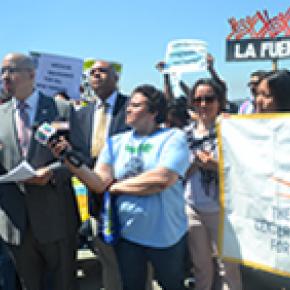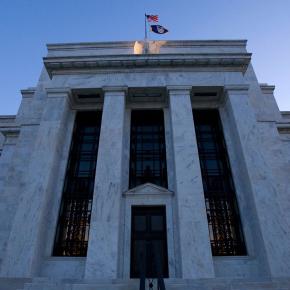N.Y. Lawmaker Aims to Give Voting Rights to Undocumented Immigrants
Reuters - June 16, 2014, by Curtis Skinner - A New York lawmaker wants to grant many of the rights of citizenship to...
Reuters - June 16, 2014, by Curtis Skinner - A New York lawmaker wants to grant many of the rights of citizenship to millions of illegal immigrants and non-citizen residents, including the right to vote in local and state elections, under a bill introduced on Monday.
The New York Is Home Act is the first bill in the United States that would provide such broad rights to non-citizens who can show they have lived and paid taxes in New York for at least three years, according to the bill's sponsor, state Senator Gustavo Rivera.
"Nearly 3 million people in the state of New York currently reside here and make New York their home, but can't fully participate in civic, political, and economic life," Rivera, a Democrat who represents the Bronx in New York City, said in a telephone interview.
He described the bill as a response to the stagnation of immigration reform efforts in the U.S. Congress.
"With failure at the national level on comprehensive immigration reform, the question we have asked is what can states do?" he said.
The bill would provide benefits to illegal immigrants and other non-citizens who could prove they have resided in New York for at least three years and have been paying taxes for as long. They would also have to take an oath to uphold the state's constitution and laws, and pledge their willingness to serve on a jury, according to the bill summary.
In return, non-citizens would receive a form of state citizenship, including access to state tuition assistance and health insurance programs, the ability to apply for driver's and professional licenses, and the right to vote in state and local elections, the summary said.
Other states have moved forward on their own with respect to tuition assistance and driver's licenses, Rivera said, but no other state has considered such a broad package for its non-citizens.
The current legislative session ends on Thursday and Rivera said that he doesn't expect the bill to pass before then. Rather, he said, he hopes the bill will start a conversation both in New York and nationally about immigration reform at the state level.
Source
Pittsburgh marchers decry racial, economic injustice

Pittsburgh marchers decry racial, economic injustice
The message was often strident, but the mood of Friday afternoon’s “Still We Rise” march was spirited. More than 1,500...
The message was often strident, but the mood of Friday afternoon’s “Still We Rise” march was spirited. More than 1,500 demonstrators, some in strollers, marched down Grant Street under the wing of a gold-crested phoenix, a mythical bird whose rebirth from its own ashes captured the march theme.
“It was beautiful, it was powerful, and it was peaceful,” said Erin Kramer, the head of local activist group One Pittsburgh.
The march drew support from People’s Convention, a two-day gathering of left-leaning community activist groups from 30 states. Demonstrators wielded caricatures of Republican presidential candidate Donald Trump and UPMC head Jeffrey Romoff, in complementary shades of red-orange. And they made frequent stops along Grant Street, where speakers denounced what they saw as cases of racial and economic injustice.
Check back for more updated video with interviews and more scenes from the "Still We Rise" march to protest growing inequality and hate. (Video by Pam Panchak; edited by Melissa Tkach)
A key concern was rising distrust between police and minority groups nationwide. This week, two African-American men, Louisiana resident Alton Sterling and Minnesota resident Philando Castile, died at the hands of police. Five officers were killed by a sniper during a Thursday protest in Dallas.
Outside the Allegheny County Courthouse, demonstrators chanted “Indict, convict, send those killer cops to jail. The whole damn system is guilty as hell.” Still, while a stepped-up police presence was noticeable during the march, there was little tension.
“I’m not feeling any concern” about the marchers, said Police Chief Cameron McLay, who was on hand for the event. Police, he said, were watching for “what else is out there,” including possible attacks on the marchers themselves. The chief called the event “a positive demonstration of First Amendment rights.”
Michelle Tremillo, executive director of the Texas Organizing Project, said members of her organization had participated in the Dallas protest. "It took us until 1 a.m. to make sure that all of our people were home safely," she said. "I was struggling to be here."
"My heart aches for Alton’s family, my heart aches for Philando’s family, and my heart aches for those police officers and their families," Ms. Tremillo said.
But she and others said they hoped shock over the Dallas shooting wouldn’t obscure the racial- and economic-justice issues raised by the march. "I'd hate for that to get lost."
Outside the federal courthouse, demonstrators called for the release of Martin Esquivel-Hernandez, a Mexico-born Pittsburgh resident facing deportation. In May, the Department of Justice said Mr. Esquivel-Hernandez had previously been removed from the United States four times. But Friday his wife, Alma, held aloft his shoes and through an interpreter called him a “father of a U.S. citizen [and] a hard worker. The system has failed him and all of us.”
The march ended outside Republican Sen. Pat Toomey’s office in Station Square, where demonstrators decried fracking for natural gas.
“We wanted to display unity and make the connection between racial justice and economic justice,” said Ana Maria Archila, a co-executive director of the Center for Popular Democracy, which is hosting the convention. “And the march really achieved that.”
By Chris Potter
Source
Las ciudades advierten a las empresas que no cooperen con Trump
Las ciudades han sido los principales puntos de resistencia contra la política de Donald Trump, en particular sus...
Las ciudades han sido los principales puntos de resistencia contra la política de Donald Trump, en particular sus planes de tomar medidas contra los inmigrantes.
Las ciudades se han mantenido firmes y proclamado orgullosamente ser santuarios de inmigrantes ante las amenazas de la Casa Blanca de quitarles fondos federales. Han prometido apoyar el acuerdo de París sobre el clima después del sorpresivo anuncio de Trump de que Estados Unidos dejará de respaldar el histórico pacto.
Lea el artículo completo aquí.
For Many Americans, the Great Recession Never Ended. Is the Fed About to Make It Worse?
When the Federal Reserve considers raising interest rates on July 28—and then again every six weeks after—MyAsia Reid,...
When the Federal Reserve considers raising interest rates on July 28—and then again every six weeks after—MyAsia Reid, of Philadelphia, will be paying close attention. Despite holding a bachelor’s degree in computer science, completing a series of related internships, and presenting original research across the country, Reid could not find a job in her field and, instead, pieces together a nine-hour-per-week tutoring job and a 20-hour-per-week cosmetology gig. The 25-year-old knows that an interest-rate hike will hurt her chances of finding the kinds of jobs for which she has trained, and earning the wage increase she so desperately needs.
A Fed decision to raise interest rates, expected sometime this year, amounts to a vote of confidence in the economy—a declaration that we have achieved the robust recovery we need. “We are close to where we want to be, and we now think that the economy cannot only tolerate but needs higher interest rates,” the chairwoman of the Federal Reserve, Janet Yellen, told Congress during a July 15 policy briefing.
But for many millions of Americans, the recovery has yet to arrive, and for them, a rate hike will be disastrous. It will put the brakes on an economy still trudging toward stability; stall progress on unemployment, especially for African-Americans; and slow wage growth even more for the vast majority of American workers.
The general argument for raising interest rates is that it will prevent wage costs from pushing up inflation. However, there is no data suggesting price instability; nor is there any indication that wages have risen enough to spur such inflation. For the overwhelming majority of American workers, wages have stagnated or even dropped over the past 35 years, even as CEOs have seen their compensation grow 937 percent. During the same period, wage gaps between white workers and workers of color have increased, and black unemployment is at the level of white unemployment at the height of the Great Recession. Meanwhile, the labor-force participation rate is less than 63 percent, the lowest in nearly four decades, suggesting that many Americans have simply given up looking for work.
Yellen has herself often urged the Fed to look at the broadest possible employment picture. Yet, during her recent congressional testimony, shedownplayed the Fed’s ability to address racial disparities, saying that the central bank does not “have the tools to be able to address the structure of unemployment across groups” and that “there isn’t anything directly that the Federal Reserve can do” about it. She cited, rightly, a range of other factors, including disparate educational attainment and skill levels, that contribute to economic and social disparities between racial groups. But she also glossed over the importance of the economic environment in shaping workers’ unequal chances.
One defining metric in shaping workers’ chances is the unemployment rate. A high unemployment rate facilitates racial discrimination. When there are too many qualified job candidates for every job, employers can arbitrarily limit their labor pool based on unnecessary educational requirements, irrelevant credit or background checks, or straightforward bias. A tight labor market, by contrast, makes it much harder for employers to succumb to prejudices and overlook qualified workers simply because of bias. When the number of job seekers matches the number of job vacancies, African-Americans, Latinos, women, gays and lesbians, injured veterans, and formerly incarcerated workers finally get their due in the workforce.
The late 1990s, when unemployment was at about 4 percent, bear out this thesis. During that rosier era, black unemployment was 7.6 percent, and the ratio of black family income to white family income rose substantially.
As the guardian of monetary policy, the Federal Reserve has a number of tools for encouraging a tight labor market, and one of those tools is to keep interest rates low. By keeping rates low, the Fed creates a hospitable environment for job growth by lowering the borrowing costs for consumer and business spending—including hiring new workers. By contrast, raising rates deliberately suppresses spending by consumers and businesses. In the process, it slows job growth, holds down wages, and unnecessarily maintains racial disparities.
With so many workers still struggling, there is no need to cut off this recovery prematurely. Inflation remains below the Fed’s already-low 2 percent target, unemployment and underemployment are too high, and wage growth and labor-force participation are too low. In fact, the Fed should be doing everything within its power to keep nudging the recovery forward for the workers still caught in the slipstream of the Great Recession.
The Federal Reserve should not raise interest rates this week, nor when it meets again six weeks after that. It should not raise rates at all in 2015. Doing so would cause tremendous harm to the aspirations and lives of tens of millions of working families, and would disproportionately hurt African-Americans.
MyAsia Reid knows the difference that a full-employment economy can make. She is ready to participate in the economic recovery. And she will be watching as the Fed decides whether to hold to a strategy of strengthening the recovery or pursue a new strategy that jeopardizes her chances and her community.
Source: The Nation
Don't Tinker with Md.'s Charter School Law
The Baltimore Sun - January 12, 2015, by Betty Weller and Verjeana Jacobs - The headlines in other states warning...
The Baltimore Sun - January 12, 2015, by Betty Weller and Verjeana Jacobs - The headlines in other states warning against weak charter school laws are mounting. In May, a report from the Center for Popular Democracy and Integrity in Education found that unscrupulous charter school operators in 15 states had lost, misused or wasted more than $100 million in taxpayer money.
A yearlong investigation by the Detroit Free Press found that Michigan's weak charter school law resulted in the state spending $1 billion annually on schools with little transparency, consistently poor results and questionable financial practices.
And in September, community groups in Philadelphia released a report finding that charter school officials had defrauded students and schools of at least $30 million since 1997.
Most recently, Ohio's Republican governor, John Kasich, spoke about the dire need to strengthen state regulation of charter schools to stem poor performance and financial mismanagement.
Fortunately, Maryland has not experienced these problems, thanks to the state's strong charter school law. Since 2003, Maryland's Charter School Act has promoted high standards, real accountability to students, parents and communities, and sound financial management.
That this track record of success has been questioned recently by The Sun is deeply troubling ("More choices for parents and students," Dec. 21).
It makes little sense to label a law "weak" because it holds charter schools to the same high academic and financial management standards as other public schools.
Maryland's charter school law has protected us from the "worst-case scenarios" of financial mismanagement, persistently failing schools and conflicts between local communities and charter school operators that have plagued states with weaker laws than ours.
Ensuring local school board oversight and highly qualified teachers in the classroom are hallmarks of Maryland's charter school law. We need to protect Maryland's strong charter school law to ensure that charter schools are run well, and that all students, whether they're in a charter or a traditional public school, receive high quality instruction.
Source
Be Our Guest: The downside of immigration reform is increased deportation of immigrants who don’t deserve it
New York Daily News - February 25, 2013 - Nisha Agarwal - President Obama and Congress have not addressed the federal...
New York Daily News - February 25, 2013 - Nisha Agarwal - President Obama and Congress have not addressed the federal Secure Communities program, which has created a deportation pipeline that tears apart thousands of immigrant families.
In recent weeks, the federal fight for immigration reform kicked off in earnest, with Congress and the White House issuing their legislative principles, and the White House “leaking” specific proposals for a bill. Reform offers the bright possibility of legalization for 11 million, including more than 700,000 New Yorkers who live and work in, contribute to and sustain our richly diverse city and state. But the dark side of reform — its painful compromise — may be an increase in federal immigration enforcement efforts.
The Senate and the President’s proposals demand further fortification of the borders and better tracking of visa-holding immigrants. They also do not address the federal Secure Communities program, which has failed utterly in its objective to identify violent and dangerous criminals and, instead, creates a detention and deportation pipeline that has torn apart thousands of immigrant families.
New York City is poised to alter the terms of the national debate, however, by pushing back against Secure Communities and highlighting the destructive impact of the program for New York’s immigrant communities and the city itself. Recently, City Council Speaker Christine Quinn and Councilwoman Melissa Mark-Viverito introduced two bills that will limit the extent to which the Department of Corrections and the NYPD collaborate with federal Immigration Customs and Enforcement officials through the Secure Communities program.
These bills, which are due to pass this week, build upon a law enacted in 2011 that would prevent the Department of Corrections from turning over to federal immigration authorities certain individuals being held at Riker’s Island who posed no public safety threat. Before this law went into effect, thousands of immigrant New Yorkers were held at Riker’s Island every year in order to be turned over to ICE for eventual deportation. A large segment of those held posed no threat to public safety, including those who were long-term, legal permanent residents, juveniles, people seeking asylum and protection under the Violence Against Women Act, victims of human trafficking and many individuals who may have been arrested for minor infractions such as selling merchandise on the street or hopping a turnstile. What is more, the city was under no legal obligation to hold these individuals for federal authorities, but it continued to do so, spending nearly $20 million a year in city funds to subsidize a senseless and harmful federal deportation process.The new law ended this practice, better focusing the city’s limited resources, targeting enforcement and ensuring that immigrant families were not afraid to step forward as victims and witnesses to crime or to interact with their local government.
With the enactment of Secure Communities in New York in May 2012, ICE has been able to “flag” immigrants moving through the criminal justice system far faster and earlier in the process than had previously been possible because it allows for the sharing of fingerprint data almost instantaneously between the Federal Bureau of Investigation and ICE. A bad system of indiscriminate immigration enforcement was made much worse under Secure Communities.
Now, New York City is once again faced with the challenge of having to subsidize and support a broken and deeply flawed federal immigration enforcement system. Immigrant New Yorkers are coming into our courts and through our police precincts at risk of being siphoned into deportation proceedings, even if they have committed no crime, are themselves victims of crime or domestic violence or have committed only minor status-related crimes such as driving without a license. Perversely, many immigrant defendants now arrive at arraignments already having been identified by ICE and therefore find it in their best interest to be sent to Riker’s Island rather than released on bail because they are at risk of being turned over to immigration authorities upon release.
The new bills introduced in the City Council will put a stop to these perverse outcomes, ensuring that individuals who have no criminal record, immigrants who have committed only low-level or some status-based offenses, and immigrant youth, among others, are not ensnared by the deportation dragnet when they pose no threat to the public.
This legislation was developed in partnership with Mayor Bloomberg and the NYPD, as well as in collaboration with the immigrant community and others impacted by the harmful and inappropriate conflation of the criminal justice process with civil immigration enforcement. It is New York City speaking with one voice, reaffirming our collective values: the importance of trust between government and the people it serves; the commitment to diversity, openness and inclusion; and the enduring, stubborn passion to be a city that attracts and supports a world of talent and human potential. The proposed legislation is also New York’s call to the rest of the country, as national attention focuses on the possibility of comprehensive immigration reform.
The era of exclusion and impunity is over. We must choose a path forward that protects our families, sustains our communities and promotes the hard work and opportunity that boosts our economy.
Nisha Agarwal is deputy director of the Center for Popular Democracy (www.populardemocracy.org) and a lecturer at Columbia Law School.
Source
Signature gathering begins for $12 minimum wage initiative

Signature gathering begins for $12 minimum wage initiative
PHOENIX (AP) - A group advocating for worker’s rights is gathering signatures for a ballot initiative in Arizona that...
PHOENIX (AP) - A group advocating for worker’s rights is gathering signatures for a ballot initiative in Arizona that would increase the minimum wage to $12 an hour by 2020, at the same time Republican lawmakers are proposing their own ballot measure that would give the Legislature sole authority to set the wage in the state.
The fight over Arizona’s minimum wage has grown amid widespread worker frustration over sluggish wage growth that has fueled presidential campaigns and led to legislative battles on both sides of the country - California and New York lawmakers are poised to pass bills lifting the minimum wage to $15 an hour over the next several years.
The Fair Wages and Healthy Families Initiative incrementally increases minimum wage in Arizona to $12 per hour by 2020 and requires employers to provide earned paid sick time.
The initiative campaign has less than four months to collect more than 150,000 valid signatures necessary to get on the November ballot. Arizona’s current minimum wage is set at $8.05 per hour and is increased annually based on inflation.
Campaign manager Tomas Robles said his group has worked with people on both sides of the issues to find a compromise that offers workers a livable wage without putting too much of a burden on employers.
“We feel that this wage increase is that happy medium that protects small business and helps workers who can’t pay their rent at the end of the month even though they work full time,” he said.
The campaign committee has received backing from the Latino rights organization Living United for Change and the Center for Popular Democracy, a social and economic justice advocacy organization, Robles said. The campaign aims to collect more than 250,000 signatures using a combination of paid and volunteer petitioners to ensure they can get on the ballot.
At the same time, Arizona Republicans have proposed to increase the minimum wage to $9.50 an hour by 2020 with annual adjustments based on inflation - in a bid to stymie an increase in wages they say small businesses could not handle.
“This offering is kind of a counter-balance to the insane socialism we hear in other quarters,” said Sen. Don Shooter, R-Yuma, during a committee hearing in March.
It would also prevent cities, towns and counties from setting their own minimum wage, which Arizona Gov. Doug Ducey has said would “drive our economy off a cliff.”
The Senate Appropriations Committee passed the measure on a 5-3 party-line vote. It will now undergo a standard review before going to a Senate vote. If passed, House Concurrent Resolution 2014 could go before voters this November.
If both measures end up on the ballot and both pass, the initiative with greatest number of “yes” votes would win.
By RYAN VAN VELZER
Source
May Day rallies across U.S. target Trump immigration policy
Labor unions and civil rights groups staged May Day rallies in several U.S. cities on Monday to denounce President...
Labor unions and civil rights groups staged May Day rallies in several U.S. cities on Monday to denounce President Donald Trump's get-tough policy on immigration, a crackdown they said preys on vulnerable workers in some of America's lowest-paying jobs.
Protests and marches challenging Trump's efforts at stepping up the deportation of illegal immigrants drew crowds by the thousands to the streets of New York, Washington, Los Angeles and San Francisco, with smaller gatherings popping up across the country.
Read full article here.
Neoliberals Are Taking All the Wrong Lessons From Conor Lamb’s Victory

Neoliberals Are Taking All the Wrong Lessons From Conor Lamb’s Victory
“The recent CPC Strategy Summit in Baltimore was brimming with such ideas, which are enjoying new traction thanks to...
“The recent CPC Strategy Summit in Baltimore was brimming with such ideas, which are enjoying new traction thanks to shifting political winds. Though there’s no consensus as of yet as to what a full-fledged progressive platform might look like, the most recent People’s Budget offers hints in that direction. The Center for Popular Democracy’s Ady Barkan, who received an award from the CPC for his work organizing against the Obamacare repeal and Trump’s tax plan, suggested the party could pioneer a different way of thinking about spending and budgets.”
Read the full article here.
California Charter Schools Vulnerable to Fraud, Report Says
The Washington Post - March 24, 2015, by Emma Brown - Journalists, auditors and other investigators have turned up more...
The Washington Post - March 24, 2015, by Emma Brown - Journalists, auditors and other investigators have turned up more than $80 million in charter school fraud in California to date, according to a new report by a coalition of left-leaning organizations, which argues that lax oversight of the state’s charter schools is leaving taxpayer dollars vulnerable to abuse.
California has more than 1,100 charter schools that serve more than a half-million students — far more than any other state in the nation. They receive more than $3 billion in public funds each year. But state and local officials don’t have a rigorous enough system to ferret out misuse of those dollars, according to the report, which says that oversight relies too heavily on audits paid for by charter schools and complaints by whistleblowers.
“Despite the tremendous investment of public dollars and the size of its charter school population, California has failed to implement a system that proactively monitors charters for fraud, waste and mismanagement,” says the report.
It was released Tuesday by the Center for Popular Democracy, an advocacy group that is allied with teachers’ unions and has published several studies of state-level charter-school fraud; the Alliance of Californians for Community Empowerment Institute, an organization that works on issues including housing and education; and Public Advocates Inc., a nonprofit law firm and advocacy organization.
The report recounts some of the charter school scandals that have come to light in California. In 2012, for example, state auditors found that the American Indian Model Charter Schools (AIMS) – an Oakland school that had won national recognition for the achievement of its low-income students — had paid its founder, his wife and their various businesses about $3.8 million. The audit was initiated after a whistleblower raised concerns.
More recently, in 2014, state auditors found that a Los Angeles charter school — the Wisdom Academy of Young Scientists Charter Schools (WAYS) — had made payments totaling $2.6 million to the school’s former executive director and her family members and close associates.
“There simply isn’t enough oversight to prevent a huge amount of fraud in the charter sector, and that’s unacceptable,” said Hilary Hammell, a lawyer for Public Advocates. “That’s unacceptable because it’s vulnerable youths and their families who suffer when money that should be spent on kids at the school level instead goes elsewhere.”
The California Charter Schools Association responded with an extensive statement that called into question the motives of the report’s authors, arguing that they had turned up no evidence of a substantial problem. Many of the examples of fraud cited in the report were old and resulted in charter revocation, overhauls in school management or changes to state law, the association said.
“We agree that inappropriate use of public dollars intended for public school students should be prevented,” the statement says. “We believe that the system that California has very carefully and thoughtfully implemented does just that.”
California school system superintendents who suspect fiscal mismanagement at charter schools can request an “extraordinary audit” from a state agency known as the Financial Crisis and Management Assistance Team. But that agency — or some other oversight body — should be auditing all charter schools on a regular basis, according to the report, which argues that absent such a systemic review, misuse of tax dollars is going undetected.
Charter schools are required to submit a number of financial documents to oversight agencies and local school superintendents, including annual audits performed by private auditors. The report’s authors argued that those audits are not designed to catch fraud, while the California Charter Schools Association questioned why charter schools should have to undergo state audits when traditional public school systems do not. “To assume that there is a greater risk at charter schools than school districts, particularly in light of all the real time oversight on financial reports, is simply unfounded,” the association said.
“The report not only provides no evidence of a systemic issue, it does not do justice to the system already in place and that is actually more rigorous for charter schools than for other LEAs in the state (e.g., school districts),” the association said.
Some critics of previous reports about charter-school fraud released by the Center for Popular Democracy have also argued that those reports did not offer equal scrutiny of fraud within traditional public school systems. Others have pointed out that the center counts teachers unions — which have been critical of the charter sector — among its allies and supporters. Randi Weingarten, the president of the American Federation of Teachers, is a member of the center’s board.
Source












2 months ago
2 months ago